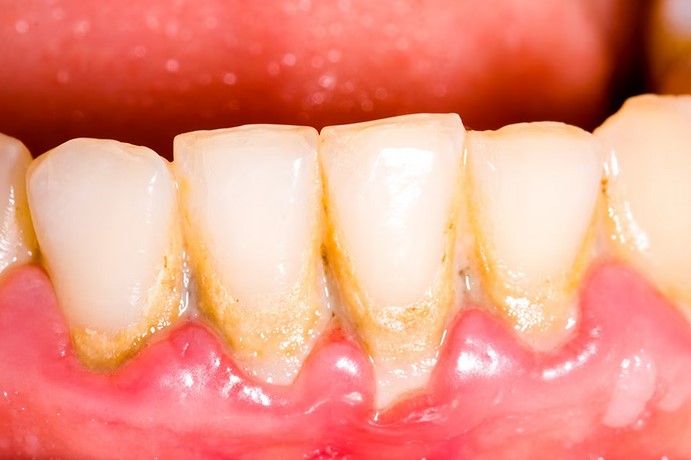Plaque, a sticky and colorless film, is a common dental concern that forms on teeth surfaces. Comprising bacteria, food particles, and saliva, plaque buildup can lead to various oral health issues if not adequately managed through regular brushing, flossing, and professional dental care.

Maintaining optimal oral health is crucial not only for a bright and confident smile but also for overall well-being. Plaque buildup on teeth is a common concern that can lead to a cascade of oral health issues if left unchecked. In this article, we’ll delve into the primary causes of plaque buildup on teeth and provide practical tips on how to prevent its formation.
Understanding Plaque Buildup
Plaque is a sticky, colorless film of bacteria that forms on the teeth and gums. It constantly accumulates on the teeth’s surface as a result of consuming food and beverages, especially those high in sugars and carbohydrates. If not properly removed, plaque can harden into tartar, which is considerably more challenging to eliminate and can lead to more severe oral health problems such as cavities, gum disease, and bad breath.
Top Causes of Plaque Buildup
1. Poor Oral Hygiene Practices
Inadequate brushing and flossing are primary culprits behind plaque buildup. When we neglect to brush and floss regularly, plaque starts to accumulate in hard-to-reach areas, such as between teeth and along the gumline. This creates an ideal environment for bacteria to flourish and contribute to plaque formation.
2. Sugary and Acidic Diets
Consuming excessive sugary foods and beverages provides fuel for the harmful bacteria in our mouths. Bacteria feed on sugars, producing acids that erode tooth enamel and contribute to plaque buildup. Similarly, acidic foods and drinks weaken enamel, making teeth more susceptible to plaque and bacteria.
3. Infrequent Dental Checkups
Regular visits to the dentist play a crucial role in preventing plaque buildup. Professional cleanings remove tartar and plaque that are difficult to eliminate through regular brushing and flossing alone. Skipping dental appointments can result in unchecked plaque accumulation and the progression of dental issues.
4. Dry Mouth
Saliva plays a crucial role in maintaining oral health by neutralizing acids and washing away food particles and bacteria. A dry mouth provides an environment where plaque can thrive, as there’s less natural cleansing taking place. Certain medications, medical conditions, and dehydration can contribute to dry mouth.
5. Tobacco Use
Smoking and tobacco use not only stain teeth but also increase the risk of plaque buildup and gum disease. These habits compromise the body’s ability to fight infections, making it easier for plaque-causing bacteria to thrive.
Preventing Plaque Buildup
1. Adopt a Rigorous Oral Care Routine
Brushing and flossing are the foundation of preventing plaque buildup. Brush your teeth at least twice a day using a fluoride toothpaste, and don’t forget to clean your tongue as well. Floss daily to remove food particles and plaque from between teeth.
2. Choose a Balanced Diet
Limit your intake of sugary and acidic foods and beverages. Opt for a diet rich in fruits, vegetables, whole grains, lean proteins, and dairy products. These choices provide essential nutrients for strong teeth and gums while minimizing the risk of plaque formation.
3. Drink Water and Chew Sugarless Gum
Drinking water throughout the day helps wash away food particles and bacteria. Chewing sugarless gum stimulates saliva production, aiding in neutralizing acids and preventing dry mouth.
4. Attend Regular Dental Checkups
Scheduling biannual dental visits allows your dentist to detect and address any potential issues early on. Professional cleanings remove tartar buildup, reducing the risk of plaque-related problems.
5. Consider Mouthwash
Antibacterial or fluoride mouthwashes can complement your oral care routine by reducing bacterial growth and strengthening tooth enamel. Consult your dentist to choose a mouthwash that suits your needs.
6. Quit Smoking and Tobacco Use
If you’re a smoker or use tobacco products, quitting can significantly improve your oral health. It will help reduce plaque buildup, enhance your body’s ability to fight infections, and promote overall well-being.
Plaque buildup on teeth is a common issue that can lead to more severe oral health complications if not addressed promptly. By adopting a thorough oral care routine, maintaining a balanced diet, attending regular dental checkups, and making healthy lifestyle choices, you can effectively prevent plaque formation and enjoy a radiant smile and optimal oral health for years to come. Remember, your oral health is a vital component of your overall well-being, so take the necessary steps to protect it.